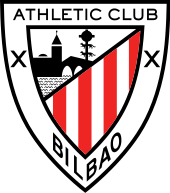Our website is made possible by displaying online advertisements to our visitors.
Please consider supporting us by disabling your ad blocker.
Athletic Bilbao
 | ||||
| Full name | Athletic Club[1][2] | |||
|---|---|---|---|---|
| Nickname(s) | Lehoiak (The Lions) Zuri-Gorriak (The Red and Whites) | |||
| Founded | 18 July 1898 | |||
| Ground | Estadio San Mamés | |||
| Capacity | 53,289[3] | |||
| Coordinates | 43°15′51.0″N 2°56′57.7″W / 43.264167°N 2.949361°W | |||
| President | Jon Uriarte | |||
| Head coach | Ernesto Valverde | |||
| League | La Liga | |||
| 2023–24 | La Liga, 5th of 20 | |||
| Website | athletic-club.eus | |||
|
| ||||
Athletic Club (Basque: Bilboko Athletic Kluba; Spanish: Athletic Club de Bilbao), commonly known abroad as Athletic Bilbao (Spanish: Athletic de Bilbao),[4] or simply as Athletic domestically, is a professional football club based in the city of Bilbao in the Basque Country, Spain. They are known as Los Leones (The Lions) because their stadium was built near a church called San Mamés, which was named after Saint Mammes, an early Christian thrown to the lions by the Romans.[5] Mammes pacified the lions and was later made a saint. The team plays its home matches at the San Mamés Stadium. Its home colours are red and white-striped shirts with black shorts.
Athletic are the fourth most successful club in La Liga with eight titles to their name. In the table of Copa del Rey titles, Athletic is second only to Barcelona, having won it 24 times.[note 1] It is also the most successful Basque football club in both league and cup titles won. The club also has one of the most successful women's teams in Spain, which has won five championships in the Primera División Femenina.
The club is one of three founding members of the Primera División that have never been relegated from the top division since its inception in 1929, the others being Real Madrid and Barcelona. These three clubs, along with Osasuna, are the only four professional clubs in Spain that are not sports corporations; instead they are owned and operated by club members. Athletic's main rivals are Real Sociedad, against whom it contests the Basque derby, and Real Madrid, due to sporting and political identity; a minor rivalry also exists with Barcelona due to historical significance. At various points in the club's history, further Basque league derbies have been contested against Alavés, Eibar and Osasuna.
The club is known for its cantera policy of bringing young Basque players through the ranks, as well as recruiting players from other Basque clubs.[9] Athletic's official policy is to sign players native to or trained in football in the greater Basque Country, which includes Biscay, Gipuzkoa, Álava and Navarre (in Spain), as well as Labourd, Soule and Lower Navarre (in France). Since 1911, Athletic has played exclusively with players meeting its own criteria to be deemed Basque.[10] It has gained Athletic both admirers and critics. The club has been praised for promoting home grown players and club loyalty. The rule does not apply to coaching staff, with several examples of non-Basques both from Spain and abroad having coached the first team.
Despite the implications of the name 'Athletic Club' in English, and unlike some of the other major Spanish teams which have several departments, it is not a multi-sport club, participating only in football, although sections for cycling and other sports existed prior to the Spanish Civil War in the 1930s.[11]
- ^ "About the club". Athletic Bilbao. Archived from the original on 12 July 2023. Retrieved 29 November 2018.
- ^ From Sporting Lisbon to Athletic Bilbao — why do we get foreign clubs' names wrong? Archived 7 April 2023 at the Wayback Machine, Michael Cox, The Athletic, 16 March 2023
- ^ "UEFA EURO 2020 Evaluation Report" (PDF). Uefa.com. Archived (PDF) from the original on 16 May 2017. Retrieved 23 January 2017.
- ^ "Athletic-Atlético, historia de dos parientes". Diario ABC (in Spanish). 8 May 2012. Retrieved 1 November 2024.
- ^ "What is Athletic Club?". Bilbao Insider. 25 April 2024. Retrieved 2 September 2024.
- ^ "Spain – Cup 1902". Rsssf.com. 15 September 2000. Archived from the original on 17 September 2006. Retrieved 23 January 2017.
- ^ "La FEF no reconocerá al Barça la Liga del año 37" [The FEF will not recognize Barça's League in 1937]. Diario AS (in Spanish). 3 April 2009. Archived from the original on 6 April 2009. Retrieved 31 December 2017.
- ^ "La Copa de la discordia" [The Cup of Discord]. El Mundo (in Spanish). 24 May 2012. Archived from the original on 14 January 2024. Retrieved 14 January 2024.
- ^ Willis, Craig; Hughes, Will; Bober, Sergiusz. "ECMI Minorities Blog. National and Linguistic Minorities in the Context of Professional Football across Europe: Five Examples from Non-kin State Situations". ECMI. Archived from the original on 14 March 2023. Retrieved 14 March 2023.
- ^ "Philosophy: What is it". Athletic Bilbao. Archived from the original on 6 March 2021. Retrieved 29 November 2018.
- ^ The Athletic Club cycling section Archived 23 September 2019 at the Wayback Machine, Athletic Bilbao, 5 September 2019
Cite error: There are <ref group=note> tags on this page, but the references will not show without a {{reflist|group=note}} template (see the help page).
Previous Page Next Page


